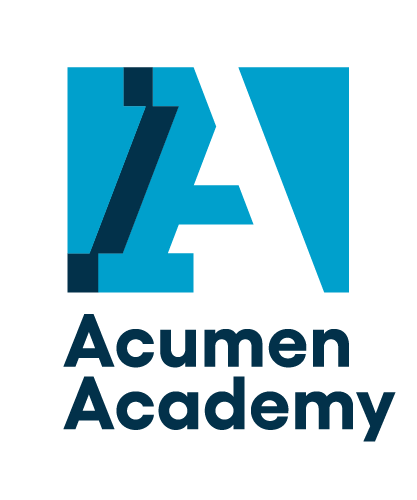20/20 Levels: the power of strategic partnerships for nonprofit scaling
Discover how one social entrepreneur approached building strategic relationships, leveraged early partnerships for growth, and used media to attract the right collaborators
Featured speakers

Leonie Jarrett
Associate director, Curriculum & Content, Acumen

Duro Oye
United Kingdom Acumen Fellow

Leonie Jarrett
Associate director, Curriculum & Content, Acumen

Duro Oye
United Kingdom Acumen Fellow
Transcript
Leonie Jarrett, Associate Director, Content and Curriculum, Acumen
Hello. If you are wondering how corporate or strategic partnerships can help take your nonprofit to the next level, this conversation is for you.
I'm Leonie. I'm part of the Content and Curriculum team at Acumen Academy. Today, I'm thrilled to be chatting with Duro Oye, an entrepreneur and Acumen Fellow based in London.
Duro has tons of experience in building strategic partnerships with corporates and I'm hoping to extract some of that wisdom for the wider community today.
We're going to dive into some of the practical strategies for identifying and cultivating strategic relationships. I'm hoping to get some tangible insights and ideas for listeners.
But to kick things off, Duro, could you tell us a bit about your background?
Duro Oye, CEO & Group CEO, 20/20 Levels
Hello, my name is Duro Oye, and I'm founder and chief exec at 20/20 Levels, which is a social mobility charity based here in London working with young people from underrepresented ethnic groups, low socioeconomic backgrounds - aged between 18 and 30 - and we support them in the areas of personal career and business development.
20/20 Levels, currently, we're set to work with 575 young people this year. And that has come up since 2021, where we were working with 140 young people. It's quite a seismic shift over that period of time.
In the year 2022, we decided to embark on a journey of a merger. All we did prior to that was career development; that's how we've managed to essentially grow our operation to be able to support just under 600 young people this year.
Leonie Jarrett
Great. You've made some big moves recently.
Tell us a bit about how you knew you were ready to make that kind of move towards scaling up and merging. That's a pretty big step.
What were the signs that you were looking for to indicate that you should go for that big push?
Duro Oye
Thinking about scale in business terms, you have the term supply and demand.
But in social impact, we flip that on its head and say, demand and supply. You see that there's a demand there, and you then go out and source the funding in order for you to be able to meet that demand.
That was exactly what happened in our case.
More and more young people were interested in our programs. The backlog of getting young people onto the program was growing and growing, and we thought to ourselves, how could we increase our capacity to be able to support more young people?
The way we decided to do that was looking at another organization that had recently started up doing something similar, and thinking about how we could bring the two organizations together to enable us to be able to reach even more young people.
Leonie Jarrett
Wow, that's such an interesting pathway that you've taken by making the decision to merge relatively early on in your journey and seeing the opportunity to collaborate with another organization who's serving the same target audience as you is really interesting.
I think it shows a lot of humility and audacity and really shows leadership in the sense that you've obviously taken your ego out of the equation to think about, how can we provide more services to our audience?
I think that's really inspiring and could be a potential pathway to scaling up and providing more impact that some people listening might not have thought of.
And I also love what you said about demand and supply for nonprofits. It's so true.
Tell us a bit more about how you're going to manage the transition and how you've been managing the transition. Because obviously, you've got existing partners who've been supporting your work. And as you've sought to join up with another organization, how have you navigated that and brought them along with the decision and made them feel excited?
Duro Oye
Partnership has played a crucial role in our scaling strategy. We work with a number of corporates - large corporates -to help us source opportunities for our young people. We had to speak to all of them to let them know that this is what we were doing, this is what we were thinking about, and this is why we felt it was a good idea.
Getting them on board was important. Working closely with my board of trustees, Board of NEDs at the time, to also help them understand the growth vision was also important, and explaining to our corporate partners what this merger would mean for them because they partner with us and they sponsor us in the area of career development. Now we're venturing into business development.
Leonie Jarrett
It's a really good example of how to bring existing partners along on a journey with you.
I would also love to dig into a bit more around how you identify new partners. So, how do you know that someone's a partner that you could work with and a collaboration is a really complementary one that could actually help you get where you're hoping to get to?
I see you're nodding - so I think you've got some great things to tell us about this.
Duro Oye
We've identified new partners to take us on this journey that we've embarked on. The way that we work, we work closely with the corporates. We've identified other organizations that also have really strong corporate sponsorship relationships. They don't have an in-depth program like we do, so we saw an opportunity for us to be able to come together.
This is still very, very early stages and we're still getting to know each other. But we've both been able to identify that we bring something unique to the table, and in coming together, we can offer our corporate partners even more of a variety of level of support.
Now, some of our partners are the same, some of our partners aren't.
The beauty of thinking about, one, the partners that are the same, and what we could offer them, but also being able to tap into their partnerships as well as them tapping into our partnerships has also been a key thing that we've been exploring and I'm really excited about the outcomes of that potential partnership.
Leonie Jarrett
Fantastic. In terms of the future, it sounds like you've got pretty well-developed and solid partnerships with corporates.
For some of the entrepreneurs listening, just getting through the door to have an initial conversation with a corporate, particularly a multinational, can be the biggest barrier of them all, especially when there's that power imbalance between a small lean startup and a very large organization. What did you do to get through the door?
It would be really good if you could share with us a little bit about how you approach that and what tactics you used to actually prospect and invite in conversations with these larger organizations that ultimately have led to these amazing partnerships that you've got. What's the key?
Duro Oye
In approaching our corporate partnership sponsorship strategy, I've been learning on the job if I'm being quite honest with you.
The first one came as a result of us making noise, not just by social media, but mainstream media. We had an article go out in a leading London paper, and the GM, general manager, of a leading sports apparel brand picked up and said, "We want to support you."
They had never supported a community organization before. We'd never had the support of a global corporate company before. We were both learning on the job. And everything that I learned from that initial relationship is what I've used to build on with other corporate companies that come in.
One key thing that I asked at the first initial meeting was that if we are successful, can you introduce us to other clients, partners, and companies within your supply chain?
They agreed to that, so I was able to leverage the initial relationship to then cultivate other relationships. Based on what I learned from that initial sponsorship agreement, I have now learned how to negotiate.
You mentioned about the power imbalance, the power dynamics as well. Having a clearer understanding as a community organization, what you bring to the table is very, very key.
For us, we can help the companies access top-tier diverse talent. They need access to top-tier diverse talent. They don't know where to find that caliber of talent, we can bring them to the table. So therefore, we're able to negotiate based on that. And that's what we've been able to do with all the companies that we currently work with. We know what we bring to the table. We know how valuable what we bring to the table is to the companies, and we don't budge on that.
And because of the success that we've had with previous relationships, others have seen that, and now they approach us to say, "We want the same thing you did with X company," and, "We want the same thing you did with X company."
And we've now started to cultivate a conference where we bring all of our partners together. We convene them, we share successes, we share failures, we share best practice, so they can then start implementing these things within their businesses as well.
Leonie Jarrett
Great. Other than that convening, how else do prospective partners hear about your success story?
Duro Oye
We amplify it on social media. We’ve got a really strong marketing department that works with PR agencies to help us amplify it in mainstream media as well.
For the very first time, we're actually going to embark on putting together an impact report. Our impact report won't just be for the year. Because of the relationships that we have with our alumni network, we're able to actually track the progress that we've helped them make in placing them into employment and also track the progression that they've seen in the companies that we placed them in — we're going to be able to capture all of that data into an impact report which we'll be publishing sometime in the near future.
One of the things that we do in terms of articulating the impact that we have to attract new corporate sponsors is showcasing it on social media, amplifying it via mainstream media.
So that way we're able to talk about the success stories, talk about the challenges, and also highlight how we can help other companies overcome these challenges.
Leonie Jarrett
Wow. Okay, we've covered a lot of ground in a short amount of time. Thanks so much for sharing all of your wisdom and experiences, Duro. I'm just going to recap for everybody listening:
We discussed the importance of partnerships in scaling and how there are different partners at different stages.
We talked about the importance of using those early partnerships to really build up your credibility and also how to bring them with you through the different stages of growth.
You also shared with us a bit about how important it is to share out your story using media and social media to attract the right partners in and to constantly, proactively communicate your organization's unique value.
I think these are really fantastic insights, and I hope they spark ideas for people listening. Thanks, Duro. You've been great and hope to speak to you again soon.
